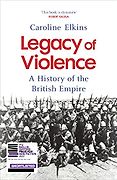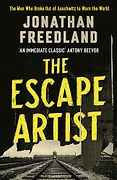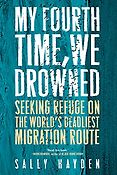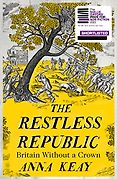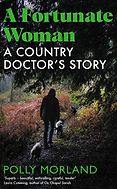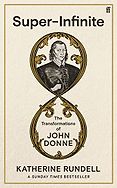Before we get to the books, could you explain what the Baillie Gifford Prize is and your own background in nonfiction?
The Baillie Gifford is the UK’s premier prize for nonfiction. I’ve been an advocate for nonfiction for more than 20 years now. I began my monthly preview of nonfiction in The Bookseller in 2000. Every month since then—I think I might have had one month off when my daughter was born—I’ve produced a fairly comprehensive guide to the nonfiction books coming out. That’s partly books which, for whatever reason, are important for booksellers to note—they’re topical or there’s a TV series or the author has a substantial track record—but, for me, even more interesting are my Editor’s Choices where I pick the cream of that month’s books. So, after flying the flag for nonfiction for all that time, it’s a huge honour for me be asked to chair the judging panel for this year’s Baillie Gifford Prize.
Tell me a bit about how you and the other judges came up with the shortlisted books.
We surveyed a vast field of submissions, right across the genres. The panel is six judges, with tremendous expertise in different fields, so they bring a very informed view to the judging process. It’s interesting when you put the judges together, what emerges organically. We are all people who read a lot, but we all discover books through the process. What emerges—especially when you get to the shortlist stage—are books that have just come through and really shone right across the different expertises that we bring to it. Whatever our personal preferences, these books have really shone out because clearly, with a panel of six judges, you’ve got to have a good consensus for a book to get this far. That’s what’s so exciting.
For the prize, the criteria the judges are looking for are pretty clear. It’s about the originality of the book: quite simply, we’re looking for something that we don’t feel that we’ve read before. It’s about the quality of the writing, which is hugely important for me. There are some incredibly erudite books out there, but it’s about how to put those ideas across to a reader who’s very distant from you. That’s where the real magic happens. The third thing is the quality of the reading experience. As chair of judges, I really want these books to be read. We want to choose books that are accessible to a regular reader, that you feel anybody could pick up and enjoy.
There’s a line on your website I thought was great and exactly what it’s all about, which is that there are a lot of books on subjects that you didn’t think you needed to know about, but as soon as you start reading, you think, ‘wow, I really want to know about this.’ There’s an element of wanting books to surprise you with the stories they tell, and the way they draw you in. For me, that is really important as well.
Over the 20 years you’ve been reviewing nonfiction, do you think there are now many more gripping books out there or is it just that I’ve reached an age where I appreciate nonfiction more?
I think there has been a rise in narrative nonfiction. It’s always been there, but I think there is a growing recognition that ‘nonfiction’ isn’t the polar opposite of fiction, which is what its name suggests. This is about terrific stories, which can happen in either a fictional or a nonfiction setting. Prizes like the Baillie Gifford have an important role to play in showing that nonfiction can be just as compelling, just as thrilling. I have always been quite nerdy, so, for me, the attraction of something being true has always made nonfiction more compelling than a lot of fiction. I do read fiction, but having that veracity gives nonfiction an edge for me. It’s not the same for everybody, but I do think that all of these shortlisted books pay attention to the story that they’re telling and do it brilliantly.
Let’s go through the books that made the shortlist of the 2022 Baillie Gifford Prize for Nonfiction. First up is Legacy of Violence: A History of the British Empire by Harvard historian Caroline Elkins, a book grappling with Britain’s imperial legacy. Can you say a bit about it and why it attracted your attention?
Legacy of Violence is probably the most academic book on the shortlist, but we all felt it was an extraordinary achievement, taking a massive subject and honing it. It’s a model of long-term research. It’s an incredibly topical subject, and often a very controversial one for people, too. It was impossible to ignore this book, in terms of not only the canvas, but also the adroitness with which she’s brought all her research together and presented it. It’s tremendous.
One thing that this and all the books on the shortlist have in common is that they are stories on a human scale. They help us understand world events or people’s lives through individual human stories. So although this is quite a daunting book, potentially, for people to confront, it is very readable and its thesis is absolutely compelling.
And is that thesis that while some people still argue the British Empire was ‘a good thing,’ it was in fact incredibly violent?
I don’t think it’s much of a surprise to hear that the legacy of colonialism was often one of violence. It’s about the systematic nature of that violence. Very often you hear people argue, ‘Well yes, there was violence here and there, but it wasn’t a deliberate policy.’ This book very convincingly shows that this was state-sponsored violence that happened across the board. That is something we need to know and we need to grapple with.
Let’s move on to the next book, which is The Escape Artist: The Man Who Broke Out of Auschwitz to Warn the World by British journalist Jonathan Freedland. This is about Rudolf Vrba, who was a Slovakian Jewish teenager, I guess, when he ended up in Auschwitz. Tell me about this book and why you liked it.
I’ve read many books that tell stories of Auschwitz. It’s very sobering when you think about the number of stories that are still coming out about those times, all these many decades later. They all merit our attention. This book is extraordinary because Rudolf Vrba and a fellow inmate, Alfred Wetzler, were the first Jews ever to break out of Auschwitz. Jonathan Freedland is a fiction writer too—he writes thrillers under the name Sam Bourne—so there is an element of thriller in the way that he describes this escape and the build-up to it. It is incredibly heart-in-your-mouth compelling. But it’s a bigger story than just one man’s breakout. Vrba goes on to try and put the word out about what’s going on in Auschwitz and saves many lives in the process. The book is memorializing one man’s heroism.
Five Books interviews are expensive to produce. If you're enjoying this interview, please support us by donating a small amount.
One of the things that’s so terrific about this book is that it charts Rudolf Vrba’s life after the war, in America, where he went on to be a chemist. It’s about how you deal with the rest of your life, after something so extraordinary has happened to you at the age of 19. This is going to sound quite strange, but he’s very often a man who is not particularly likeable. He’s a man you have very mixed feelings about, while you’re also seeing the bigger picture. The ambivalence there is just brilliantly done.
It’s a very powerful book and a Jewish friend of mine said she found it very upsetting because it’s a book that makes you think, ‘With fewer and fewer people alive to tell these stories, where, as a Jew, am I safe in the world today?’ It has all these reverberations, at the same time as being a terrific story.
Let’s go on to Sally Hayden’s book, My Fourth Time, We Drowned, which has already won the Orwell Prize for Political Writing.
Yes. The subtitle is ‘seeking refuge on the world’s deadliest migration route’—that being the route from North Africa, across the Mediterranean, to Europe. All the books on the shortlist have a topicality and the ways in which they are topical are very varied and interesting. This is a book about events that are unfolding right now, as we’re speaking. We know they’re happening, but somehow we manage to push them away and not think about them. But migration is one of the huge issues of our time and this book really makes you feel it. It’s astonishing. The reportage really brings home—again, through individual human stories—the plight of people and the reasons they’re making these terrifying bids to cross to safety. It’s just stunning and it has a real urgency. You feel these events unfolding as you read it.
I was very struck by something that Sally Hayden says in her afterword about trying to get the book published. Certain agents said it didn’t have a narrative heart or wasn’t polemical enough. It made me, personally, really want to champion the book. She’s a young journalist who is focusing on humanitarian crises and it’s a book that we all urgently need to read.
Yes, the EU and some of the international agencies come out of it looking really bad. They need to read the book too.
They do. In that sense, it is a bit of an exposé. It really shows the ineptitude and how Europe is turning its back on these people. But that’s just not possible, because this is not going to stop anytime soon.
Let’s move back in time to the 17th century now. The next book is The Restless Republic: Britain Without a Crown by Anna Keay. I was pleased to see this on the shortlist because this is a period that doesn’t normally get much attention in our history lessons, does it?
That’s what we all really loved about it. You hear so much about the Civil War and the Restoration, but this republican period has a fascination all of its own and she really brings that out. I thought, ‘Why didn’t I know more about such a pivotal period in English history?’ It also gives you a very rounded view of Oliver Cromwell. He’s a figure whose name we all know, but fewer of us know what he was like or where he came from. I certainly didn’t, so I found that incredibly illuminating.
It’s a terrifically researched work of history—erudite, but so brilliantly told. What Anna Keay has done is picked out the lives of fascinating people on different sides of the conflict. It’s easy to go straight to Samuel Pepys to hear about this period, but she’s done something really original.
Of course, since we started judging the prize and read about Charles I and Charles II—and what happened in this restless republic between the two—we’ve now got Charles III on the throne and big debates about whether we still want a monarchy or what a monarch is for. It’s a very enjoyable work of history but, again, it has that topicality running through it.
The other thing I found interesting is that within the space of just over a decade, we all thought, ‘No, we don’t want a monarch, let’s execute him.’ And then, 11 years later, ‘Yes, we do. Bring him back.’ So it’s also about how short people’s memories are. It’s terrific. I absolutely loved it.
OK, now we’re at the 5th book on the 2022 Baillie Gifford shortlist. This is A Fortunate Woman: A Country Doctor’s Story by Polly Morland. Tell me about this book.
This is such an interesting one. It’s a companion book to A Fortunate Man, John Berger’s book from the late 1960s about a country doctor. In that sense, you might think it’s going to be derivative, but it’s not at all. It opens with a wonderful story about how Polly Morland came upon a copy of A Fortunate Man and realized that it was set in the very same valley where she lives, which now has a female GP looking after it.
I love the blend that Polly Morland achieves in the book. It’s reportage, but so creative in the way that she sets out the life and work of this country doctor. She did lots and lots of interviews with her and shadowed her and I found myself marveling at how she seems to be in the head of this woman so effectively. It’s a wonderful portrait. It’s coupled with wonderful nature writing and the descriptions of the countryside where the doctor is working.
The book is also compellingly topical, because it’s about how we care for people, how the National Health Service should best operate. The GP is the closest doctor to most people. The doctor in this book builds extraordinary relationships across the community by being embedded in it herself. She is living there; she’s a close neighbor. The way she works is quite old fashioned, but I think it has so much to tell us about when medicine and caring for people is effective, and what’s needed to really make that happen. The book is just over 200 pages long and the blend is brilliant, these spare pages also broken up with fantastic photographs by Richard Baker. It’s a microcosmic gem.
And for those of us who haven’t read it, A Fortunate Man was also about a GP?
Yes, a country doctor but at a time when it was much more common for a GP to know their patients. Back then, the GP might have worked with generations of the same family. That’s much less common now, with shifting populations. In that sense, it’s not too typical, perhaps, but a real object lesson in what’s possible when you really know your patients and build relationships with them. Of course, for many people in the NHS that’s been made impossible.
We’re at the last book on the shortlist now, Super-Infinite: The Transformations of John Donne by Katherine Rundell. I’ve read quite a few of her children’s books with my kids, I had no idea she was also a fellow of All Souls College, Oxford, and a specialist in Renaissance literature! Tell me about this book and why it’s on the shortlist.
I’ve always loved a literary biography, but you don’t get quite so many of them now. It’s difficult, isn’t it, when you’re approaching the life of somebody? Almost always there’s been a previous biography, and it’s difficult to write one that really says something different and brings a new perspective. This one absolutely does and does so brilliantly. I love a book which then sends you on to other books. This is one where you think, ‘Right. I need to tackle John Donne’s poetry.’ We all know “No man is an island” and a few other bits but she really makes you want to go to his work—or return to it if you haven’t looked at it for a long time. It’s just wonderful.
She writes brilliantly. You feel her erudition and her turn of phrase is just so unexpected and fluent. She puts forward ideas about his poetry. He’s clearly one of her passions as a writer, that comes across very strongly, and she gives all the reasons why she thinks he should be much more widely read. Donne was almost a direct contemporary of Shakespeare’s, but Shakespeare’s reputation is worldwide.
Get the weekly Five Books newsletter
There’s a wonderful conclusion, where she’s saying why we should all read John Donne now. It’s about how death is always here and we have to confront it, but how doing so makes life absolutely fantastic. In a sense, that’s what his work was about. He was always living in the shadow of death, because of the times he lived in—the plague and the persecution of Catholics (he was born a Catholic). Later he was a man of the church. Death was ever present in those times. You don’t necessarily get life for very long, and you have to hold onto it. It’s quite a modern way of looking at it.
I just love the way she writes. It’s not like anybody else, I think. She’s extraordinary, Katherine Rundell, a Renaissance woman.
Part of our best books of 2022 series.
Five Books aims to keep its book recommendations and interviews up to date. If you are the interviewee and would like to update your choice of books (or even just what you say about them) please email us at [email protected]
